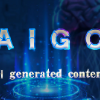With rapid advancements in large language models (LLMs), AI-generated content (AIGC) has emerged as a key driver of technological innovation and economic transformation. Personalizing AIGC services to meet individual user demands is essential but challenging for AIGC service providers (ASPs) due to the subjective and complex demands of mobile users (MUs), as well as the computational and communication resource constraints faced by ASPs. To tackle these challenges, we first develop a novel multi-dimensional quality-of-experience (QoE) metric. This metric comprehensively evaluates AIGC services by integrating accuracy, token count, and timeliness. We focus on a mobile edge computing (MEC)-enabled AIGC network, consisting of multiple ASPs deploying differentiated AIGC models on edge servers and multiple MUs with heterogeneous QoE requirements requesting AIGC services from ASPs. To incentivize ASPs to provide personalized AIGC services under MEC resource constraints, we propose a QoE-driven incentive mechanism. We formulate the problem as an equilibrium problem with equilibrium constraints (EPEC), where MUs as leaders determine rewards, while ASPs as followers optimize resource allocation. To solve this, we develop a dual-perturbation reward optimization algorithm, reducing the implementation complexity of adaptive pricing. Experimental results demonstrate that our proposed mechanism achieves a reduction of approximately $64.9\%$ in average computational and communication overhead, while the average service cost for MUs and the resource consumption of ASPs decrease by $66.5\%$ and $76.8\%$, respectively, compared to state-of-the-art benchmarks.
翻译:暂无翻译





